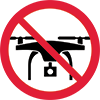 No unauthorised drone use in the national park
No unauthorised drone use in the national park
Unauthorised use of drones is prohibited. You must have a permit to fly a drone.
DOC does not generally approve permits to fly drones in this national park and we do not recommend you apply for one.
Track conditions
Check with visitor centres for any track updates and important notices, including closures or maintenance on huts, campsites, roads and tracks – also listed on Nelson/Tasman alerts.
Drinking water
Water at the huts and campsites is not treated, boil before use.
Tide times
Be sure to consult a tide timetable when planning your trip as the Awaroa estuary area on the track is only passable at low tide.
Tsunami risk
The New Zealand coastline is at risk from tsunamis, including the Abel Tasman Coast Track and its huts and campsites. If you feel a long or strong earthquake, see a sudden rise/fall in sea level, or hear loud/unusual noises from the sea, go to higher ground immediately.
Fill in the visitors book if you are staying in a hut.
Weather
The climate is mild with sea breezes, summer droughts and some winter frosts. Rainfall averages 1800mm and the sun shines around 2200 hours per year. During late spring and throughout summer the coast is subject to strong westerly winds, while the autumn and winter months are generally calm. Abel Tasman National Park weather forecast – NIWA website.
Average Temperatures
Table showing average temperatures on Abel Tasman Track.
Winter
The Abel Tasman Coast Track can be walked all year and is busiest from October to April. Winter is generally quiet, with fewer insects, calmer water, cooler temperatures and shorter daylight hours. All huts have heating. Campsites that get good afternoon sun are Anchorage, Bark Bay, Mosquito Bay, Awaroa and Tōtaranui.
Supplies
Full list of what to take on Abel Tasman Coast Track.
Wasps and sandflies
There are wasps and sandflies. We recommend carrying insect repellent for sandflies and your medication if you are allergic to wasp stings (such as antihistamines).